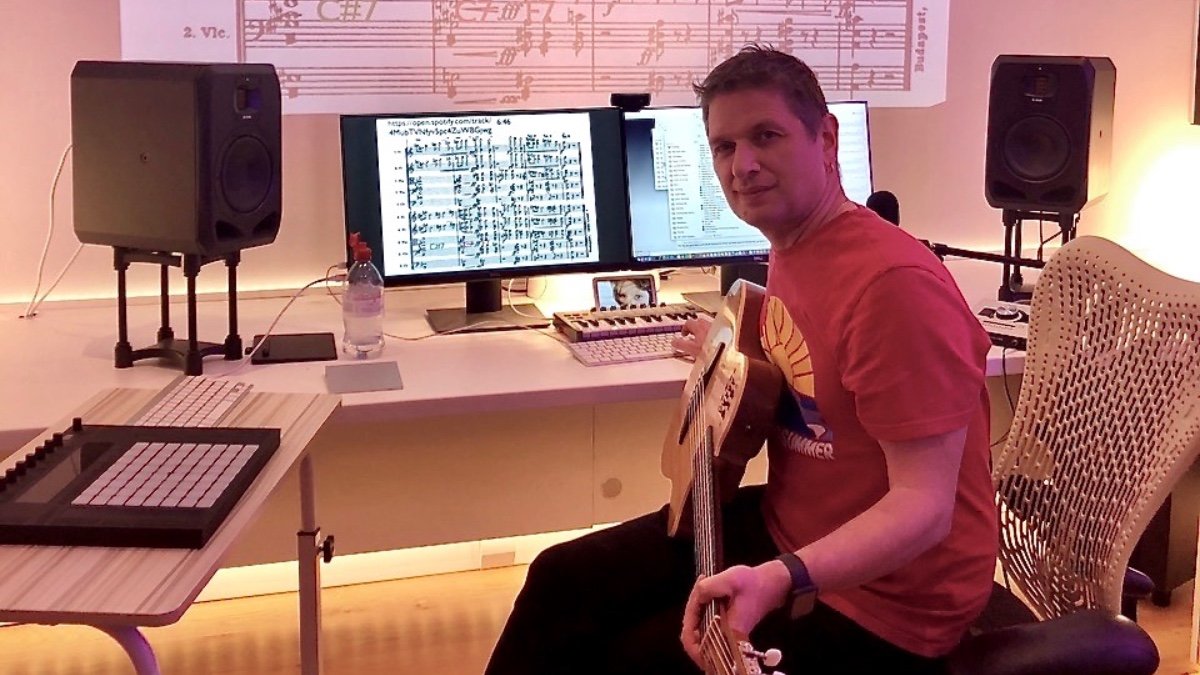Five tips for learning to play a musical instrument in lockdown
Composer, performer, producer and University of Surrey lecturer Dr Milton Mermikides has worked with artists as diverse as John Williams, Tim Minchin and Brian Eno. Here, he offers advice to anyone wanting to liberate their inner rock star during lockdown.

“There’s a world of free software and computer systems to help make music," says Milton Mermikides
“Lockdown's a great time to start learning an instrument,” says Milton, who studied quantitative economics before swapping monetary matters for melody.
The best way to learn is to practise frequently. Commit to playing for just 20 minutes a day. In a few months, that adds up to an enormous amount of time.
The analogy I use with my students is one taken from martial arts. You start off as a white belt and, by putting the belt on every day, it gradually becomes a little darker until it eventually turns to black and you’re a master.”
Milton says it’s not vital to be in possession of a traditional musical instrument either.
"There’s a world of free software and computer systems to help make music,” adds Milton. “For example, you can learn to use sequencing software. It’s highly creative and it can be a fulfilling approach to learning to compose.
YouTube is also an incredible resource.
If you want to learn a conventional instrument, the piano is wonderful because it accesses lots of musical styles. The guitar is incredible, too. You can get amazing instruments for not very much money.”
And, for those terrified by the prospect of reading music, Milton has good news, too.
“Traditionally, we think of music literacy as being able to read those funny dots and squiggles. But literacy can also mean being able to recognise a chord sequence and play it back, or understanding how harmonies fit together, which may not involve any music notation knowledge at all.
Imagine you wanted to be an actor. You could learn your lines by listening to other people say them. It may be inefficient, but you’d gain memory skills! It’s perfectly plausible to apply this approach to music, too.
Obviously, being able to read music is useful because it gives you access to a wealth of material and is a way of communicating with other musicians. But it’s not vital.”
If you fancy having a go, here are Milton’s top five tips for learning to play a musical instrument as most of us stay at home during the Covid-19 pandemic.
1) Choose what you want to play
Decide how you want to make music and ensure it fits in with your interests and lifestyle. For example, learning to play the kettle drums may not work if you share a small flat with seven people who work nights.
2) Do a little and do it often
Commit to spending a focused and uninterrupted 20 minutes every day practising.
3) Set realistic and achievable goals
It's not everyone's aim to be a concert-level performer. It shouldn’t be yours. You’re investing in a lifelong enjoyment of music. Enjoy the journey.
4) Choose your repertoire with care
It’s more likely you’ll succeed in playing music you have a connection with. You’ll also enjoy the process much more.
5) Keep it simple
It's more rewarding to play simple things well than struggle through difficult pieces. The latter is also the surest way to create frustration and lose heart.
Milton adds one last thing: “The great Russian composer, Igor Stravinsky, sat at his desk to compose at certain hours every day. An interviewer once asked him what happened if the Muse didn’t visit him. He replied: ‘At least, I kept my appointment.’ Keep your appointment and bear the above five points in mind. You’ll be up and running in no time!”
Learn more about Surrey’s Department of Music and Media.
